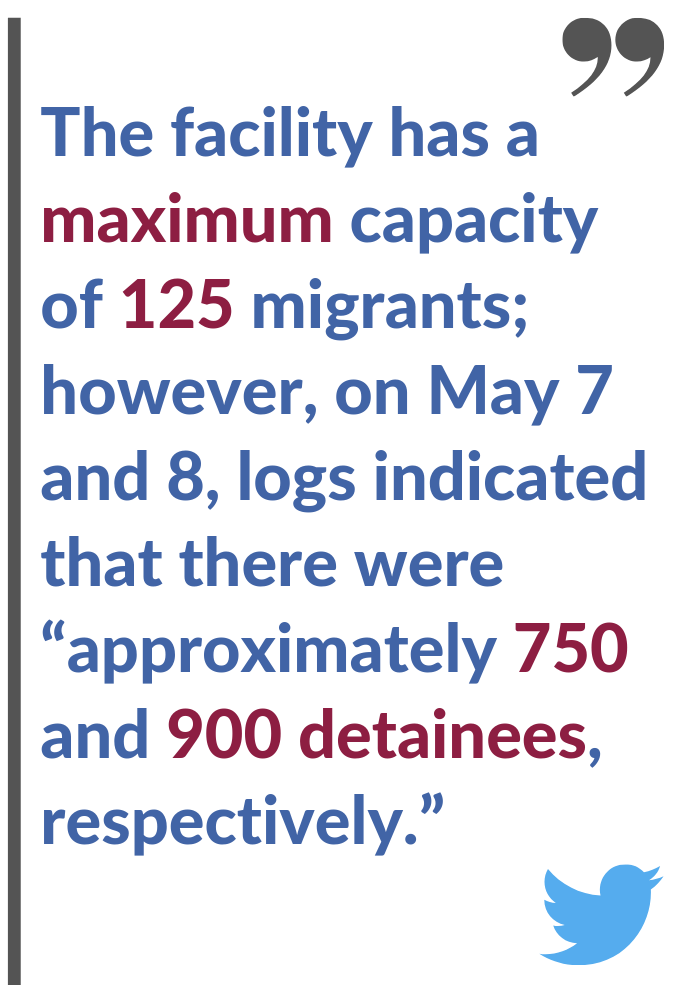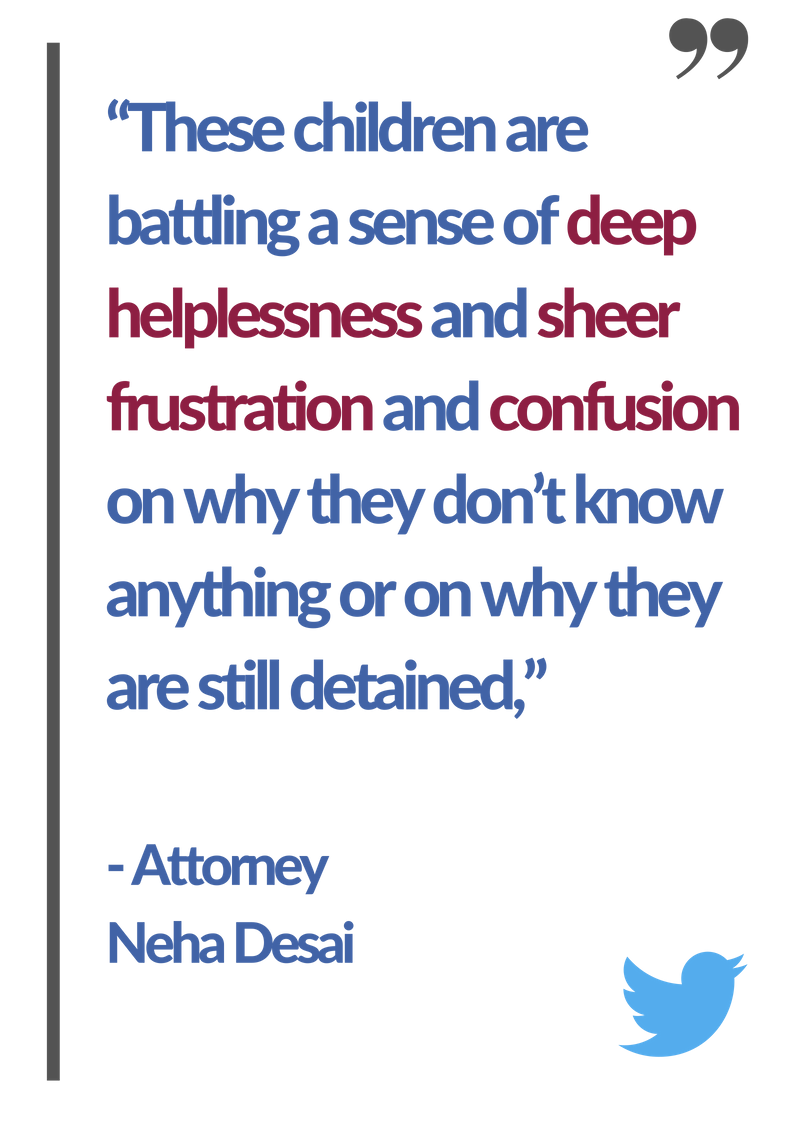
New details reveal dangerous, dismal conditions in migrant detention facilities
A trove of new information, released in just the past two weeks, reveals how dangerous and dismal conditions are for both adult and children migrants held in facilities stretching from El Paso, Texas to South Miami-Dade, Florida.
The leak of new information began on Thursday, May 30, when CNN obtained a confidential report prepared by the Department of Homeland Security’s Inspector General. The report revealed “dangerous overcrowding” and unsanitary conditions at the El Paso Del Norte Processing Center. The facility has a maximum capacity of 125 migrants; however, on May 7 and 8, logs indicated that there were “approximately 750 and 900 detainees, respectively.”

“We also observed detainees standing on toilets in the cells to make room and gain breathing space, thus limiting access to the toilets,” the report states.
A cell with a maximum capacity of 12 held 76 detainees, another with a maximum capacity of eight held 41, and another with a maximum capacity of 35 held 155, the report found.
“(Customs and Border Protection) was struggling to maintain hygienic conditions in the holding cells. With limited access to showers and clean clothing, detainees were wearing soiled clothing for days or weeks,” the report states. “Corrective action is critical to the immediate health and safety needs of detainees, who cannot continue to be held in standing-room-only conditions for weeks until additional tents are constructed.”
It is not only the detainees who are at risk, the report found. The Inspector General said Border Patrol managers were concerned about an “immediate risk to the health and safety” of DHS agents and officers, and that employee morale is decreasing. There is a “high incidence of illness” among staff, the report states. In addition, at the El Paso facility and others that were subjected to surprise inspections, some employees eligible for retirement were moving up their retirement dates and others were looking for work elsewhere.
Last week, Voices for Human Needs wrote about the deaths of six migrant children since September who either were, or at one time had been, in Border Patrol custody. Before those six deaths, the last time a migrant child had died in Border Patrol custody was 2010.
Also last week, NBC News reported that Department of Homeland Security (DHS) officials have warned, both publicly and privately, that more deaths will occur unless the Department of Health and Human Services (HHS), which receives migrant children from DHS, increases its capacity. HHS, while acknowledging problems with overcrowding, contends that its hands are tied without more funding from Congress.
Meanwhile, even as facilities along the Texas border came under renewed scrutiny, lawyers advocating on behalf of migrant children released alarming documentation regarding the children’s treatment at a private detention facility in South Miami-Dade.
The Homestead Temporary Shelter for Unaccompanied Children was in the news a month ago when it was revealed that John Kelly, the former Director of Homeland Security and White House Chief of Staff had joined the Board of Directors of Caliburn International, the for-profit company that operates Homestead.
As the Miami New Times put it, “The news is shocking and raises some serious ethical questions, because one of the chief architects of America’s immigration policies now stands to profit from the same child-imprisonment policies he helped install.”
On Monday, June 3, the Miami Herald published a front-page story detailing a 705-page court document that was filed by lawyers advocating on behalf of migrant children. The court filing was based in part on interviews with detainees; lawyers spent “substantial time” inside the facility and were able to interview children away from the prying ears of Homestead personnel.
 “I interviewed many children that were in such distress that they cut themselves,” attorney Neha Desai told the Miami Herald.
“I interviewed many children that were in such distress that they cut themselves,” attorney Neha Desai told the Miami Herald.
She recounted the story of a 14-year-old girl from Honduras whose mom died from cancer when the girl was 8.
“Her aunt took over as her parent. Years later they crossed the border together, but were forcibly separated,” Desai said of the girl, who said she had been detained for eight months at the time of the interview. “The girl was never told where she was being taken or why. Her aunt was placed in ICE [Immigrant and Customs Enforcement] detention elsewhere while her niece was taken to Homestead… She started to cut herself.”
The document was filed in a California court as part of an effort to demonstrate that the federal government is violating the Flores agreement. That agreement commits the federal government to follow a policy that requires having migrant children released to parents, other relatives, guardians, or licensed programs (the latter when family arrangements are not available, or during the period when investigations to ensure the proper placement are taking place). It also limits to 20 days the length of time children can remain at a detention center. But the Department of Health and Human Services has maintained that the 20-day rule does not apply to Homestead because it is considered an “emergency and temporary influx center.”
According to the Miami Herald, the court document describes a daily routine that stipulates no hugging, no touching, no lending clothes, no taking food to the bunk room where the children sleep.
 It quotes one teenager, who states: “Sometimes when your friend is crying because they can’t stand being here any longer, you want to be able to give them a hug. But you can’t because it’s against the rules….There are cameras watching us.”
It quotes one teenager, who states: “Sometimes when your friend is crying because they can’t stand being here any longer, you want to be able to give them a hug. But you can’t because it’s against the rules….There are cameras watching us.”
Showers are limited to five minutes, the court document states, with 15 minutes allotted for meals. There are no water or bathroom breaks without permission, and telephone calls to relatives are limited to twice a week, ten minutes each.
“These children are battling a sense of deep helplessness and sheer frustration and confusion on why they don’t know anything or on why they are still detained,” said Desai, the lawyer-advocate. “It’s profoundly distressing for them and something needs to be done.”
Advocates say they not only want to see Flores enforced – they also want the Homestead facility closed for good. Joshua Rubin, an advocate who helped shut down a child migrant detention facility in Tornillo, Texas, said he hopes litigation “brings to end this brutal regime.”

